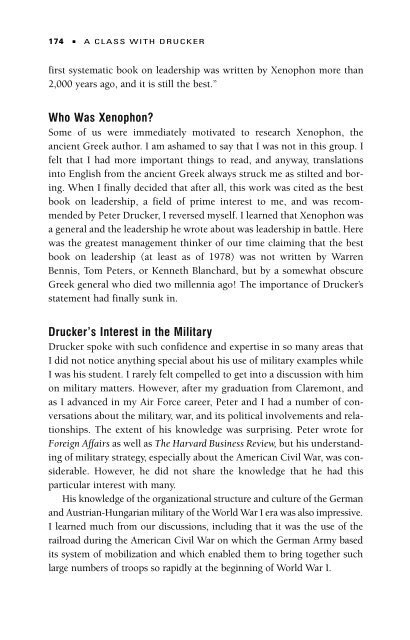A Class with Drucker - Headway | Work on yourself
A Class with Drucker - Headway | Work on yourself
A Class with Drucker - Headway | Work on yourself
You also want an ePaper? Increase the reach of your titles
YUMPU automatically turns print PDFs into web optimized ePapers that Google loves.
174 ■ A CLASS WITH DRUCKER<br />
first systematic book <strong>on</strong> leadership was written by Xenoph<strong>on</strong> more than<br />
2,000 years ago, and it is still the best.”<br />
Who Was Xenoph<strong>on</strong>?<br />
Some of us were immediately motivated to research Xenoph<strong>on</strong>, the<br />
ancient Greek author. I am ashamed to say that I was not in this group. I<br />
felt that I had more important things to read, and anyway, translati<strong>on</strong>s<br />
into English from the ancient Greek always struck me as stilted and boring.<br />
When I finally decided that after all, this work was cited as the best<br />
book <strong>on</strong> leadership, a field of prime interest to me, and was recommended<br />
by Peter <str<strong>on</strong>g>Drucker</str<strong>on</strong>g>, I reversed myself. I learned that Xenoph<strong>on</strong> was<br />
a general and the leadership he wrote about was leadership in battle. Here<br />
was the greatest management thinker of our time claiming that the best<br />
book <strong>on</strong> leadership (at least as of 1978) was not written by Warren<br />
Bennis, Tom Peters, or Kenneth Blanchard, but by a somewhat obscure<br />
Greek general who died two millennia ago! The importance of <str<strong>on</strong>g>Drucker</str<strong>on</strong>g>’s<br />
statement had finally sunk in.<br />
<str<strong>on</strong>g>Drucker</str<strong>on</strong>g>’s Interest in the Military<br />
<str<strong>on</strong>g>Drucker</str<strong>on</strong>g> spoke <str<strong>on</strong>g>with</str<strong>on</strong>g> such c<strong>on</strong>fidence and expertise in so many areas that<br />
I did not notice anything special about his use of military examples while<br />
I was his student. I rarely felt compelled to get into a discussi<strong>on</strong> <str<strong>on</strong>g>with</str<strong>on</strong>g> him<br />
<strong>on</strong> military matters. However, after my graduati<strong>on</strong> from Clarem<strong>on</strong>t, and<br />
as I advanced in my Air Force career, Peter and I had a number of c<strong>on</strong>versati<strong>on</strong>s<br />
about the military, war, and its political involvements and relati<strong>on</strong>ships.<br />
The extent of his knowledge was surprising. Peter wrote for<br />
Foreign Affairs as well as The Harvard Business Review, but his understanding<br />
of military strategy, especially about the American Civil War, was c<strong>on</strong>siderable.<br />
However, he did not share the knowledge that he had this<br />
particular interest <str<strong>on</strong>g>with</str<strong>on</strong>g> many.<br />
His knowledge of the organizati<strong>on</strong>al structure and culture of the German<br />
and Austrian-Hungarian military of the World War I era was also impressive.<br />
I learned much from our discussi<strong>on</strong>s, including that it was the use of the<br />
railroad during the American Civil War <strong>on</strong> which the German Army based<br />
its system of mobilizati<strong>on</strong> and which enabled them to bring together such<br />
large numbers of troops so rapidly at the beginning of World War I.


